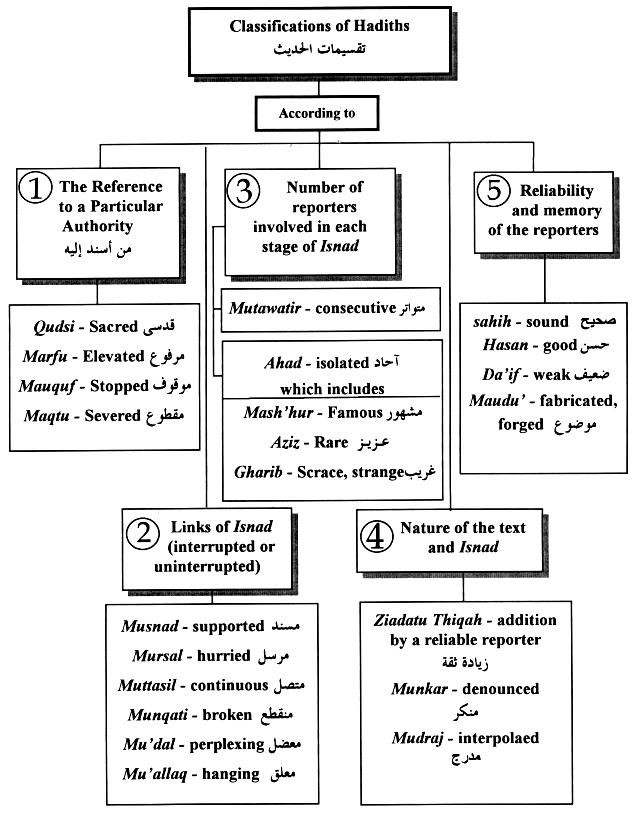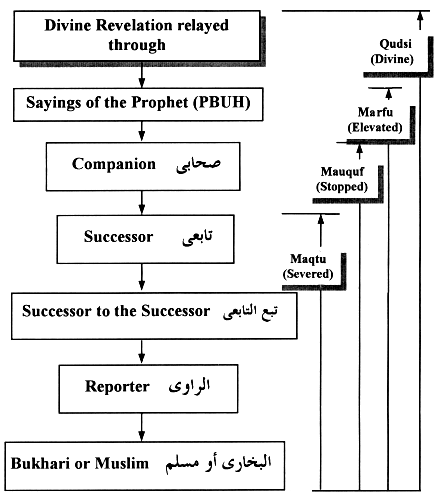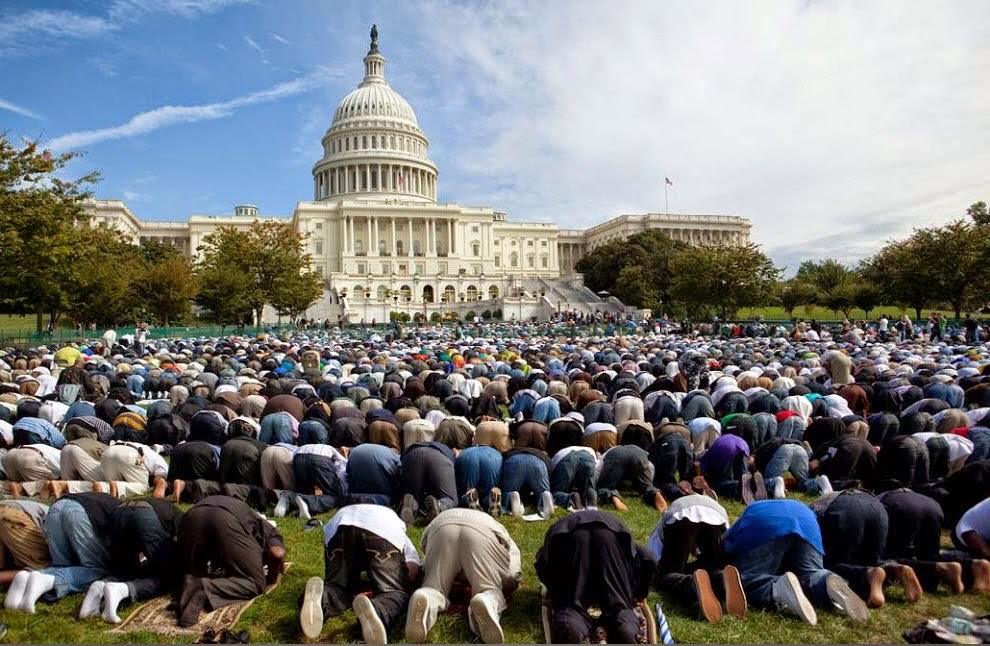In the Name of Allah, the Most Compassionate the Most Merciful
We have, Without doubt, sent down the message: and we will assuredly guard it (from corruption) (Qur'an 15:9)
The promise made by Allah(SWT) in Qur'an 15:9 is obviously fulfilled in the undisputed purity of the Qur'anic text throughout the fourteen centuries since its revelation. However, what is often forgotten by many Muslims is that the divine promise also includes, by necessity, the
Sunnah of the Prophet(P), because the
Sunnah is the practical example of the implementation of the Qur'anic guidance, the wisdom taught to the Prophet(P) along with the scripture, and neither the Qur'an nor the
Sunnah can be understood correctly without the other.
Allah(SWT) preserved the
Sunnah by enabling the Companions and those after them to memorize, write down and pass on the statements of the Prophet(P), and the descriptions of his way, as well as to continue the blessings of practicing the
Sunnah.
Later, as the purity of the knowledge of the
Sunnah became threatened, Allah(SWT) caused the Muslim
Ummah to produce individuals with exceptional memory skills and analytical expertise, who travelled tirelessly to collect thousands of narrations and distinguish the true words of prophetic wisdom from those corrupted by weak memories, from forgeries by unscrupulous liars, and from the statements of the large number of
Ulama (scholars), the Companions and those who followed their way. All of this was achieved through precise attention to the words narrated, and detailed familiarity with the biographies of the thousands of reporters of
hadith.
The methodology of the expert scholars of
hadith in assessing the narrations and sorting out the genuine from the mistaken and fabricated, for ms the subject matter of the science of
hadith. In this article a brief discussion is given of the terminology and classifications of
hadith.
Components Of Hadith
A
hadith is composed of three parts (see the figure [below]):
Matn (text),
isnad (chain of reporters), and
taraf (the part, or the beginning sentence, of the text which refers to the sayings, actions or characteristics of the Prophet(P), or his concurrence with others action). The authenticity of the
hadith depends on the reliability of its reporters, and the linkage among them.
Classifications Of Hadith
A number of classifications of
hadith have been made. Five of these classifications are shown in the figure [below], and are briefly described subsequently.

- According to the reference to a particular authority
Four types of hadith can be identified.
- Qudsi - Divine; a revelation from Allah(SWT); relayed with the words of the Prophet(P).
- Marfu` - elevated; a narration from the Prophet(P), e.g., I heard the Prophet(P) saying ...
- Mauquf- stopped: a narration from a companion only, e.g., we were commanded to ...
- Maqtu` - severed: a narration from a successor.
- According to the links of isnad - interrupted or uninterrupted
Six categories can be identified.
- Musnad - supported: a hadith which is reported by a traditionalist, based on what he learned from his teacher at a time of life suitable for learning; similarly - in turn - for each teacher until theisnad reaches a well known companion, who in turn, reports from the Prophet(P).
- Muttasil - continuous: a hadith with an uninterrupted isnad which goes back only to a companion or successor.
- Mursal - hurried: if the link between the successor and the Prophet(P) is missing, e.g., when a successor says "The Prophet said...".
- Munqati`- broken: is a hadith whose link anywhere before the successor (i.e., closer to the traditionalist recording the hadith) is missing.
- Mu`adal - perplexing: is a hadith whose reporter omits two or more consecutive reporters in the isnad.
- Mu`allaq - hanging: is a hadith whose reporter omits the whole isnad and quotes the Prophet(P) directly (i.e., the link is missing at the beginning).
- According to the number of reporters involved in each stage of isnad
Five categories of hadith can be identified:
- Mutawatir - Consecutive: is a hadith which is reported by such a large number of people that they cannot be expected to agree upon a lie, all of them together.
- Ahad - isolated: is a hadith which is narrated by people whose number does not reach that of the mutawatir.
It is further classified into:
- Mash'hur - famous: hadith reported by more than two reporters.
- `Aziz - rare, strong: at any stage in the isnad, only two reporters are found to narrate the hadith.
- Gharib - strange: At some stage of the isnad, only one reporter is found relating it.
- According to the nature of the text and isnad
- Munkar - denounced: is a hadith which is reported by a weak narrator, and whose narration goes against another authentic hadith.
- Mudraj - interpolated: an addition by a reporter to the text of the hadith being narrated.
- According to the reliability and memory of the reporters
This provides the final verdict on a hadith - four categories can be identified:
- Sahih - sound. Imam al-Shafi`i states the following requiremetts for a hadith, which is not Mutawatir, to be acceptable "each reporter should be trustworthy in his religion; he should be known to be truthtul in his narrating, to understand what he narrates, to know how a different expression can alter the meaning, and to report the wording of the hadith verbatim, not only its meaning".
- Hasan - good: is the one where its source is known and its reporters are unambiguous.
- Da`if - weak: a hadith which fails to reach the status of Hasan. Usually, the weakness is: a) one of discontinuity in the isnad, in which case the hadith could be - according to the nature of the discontinuity - Munqati (broken), Mu`allaq (hanging), Mu`adal (perplexing), or Mursal (hurried), or b) one of the reporters having a disparaged character, such as due to his telling lies, excessive mistakes, opposition to the narration of more reliable sources, involvement in innovation, or ambiguity surrounding his person.
- Maudu`- fabricated or forged: is a hadith whose text goes against the established norms of the Prophet's sayings, or its reporters include a liar. Fabricated hadith are also recognized by external evidence related to a discrepancy found in the dates or times of a particular incident.
So you'd all be wrong to say that hadeeth are "chinese whispers" lol... even western scholars are in awe of the Science of Hadeeth.
Also, as a brother quite rightly pointed out to the ignorant sister - how does one learn how to worship God in the Quran? Allah tells you in the Quran that the example of the Prophet pbuh is the best one - but where is his example recorded in the Quran? It is not - it is recorded in ahadeeth - the sheer fact that she has not emplyed any logic to her bias but the very lame and unprovable claim of "chinese whispers" shows exactly how shallow a mind she has. Unfortunately for her, she calls herself a Muslim, wears a saree (hindu clothing) and doesn't even know how to fulfil her obligations as a Muslim.
Quranites are escapists - who are what I term as "lip service Muslims". Good for nothing.
Scimi

 ! There are many more. So tradition is not always the solution.
! There are many more. So tradition is not always the solution.


